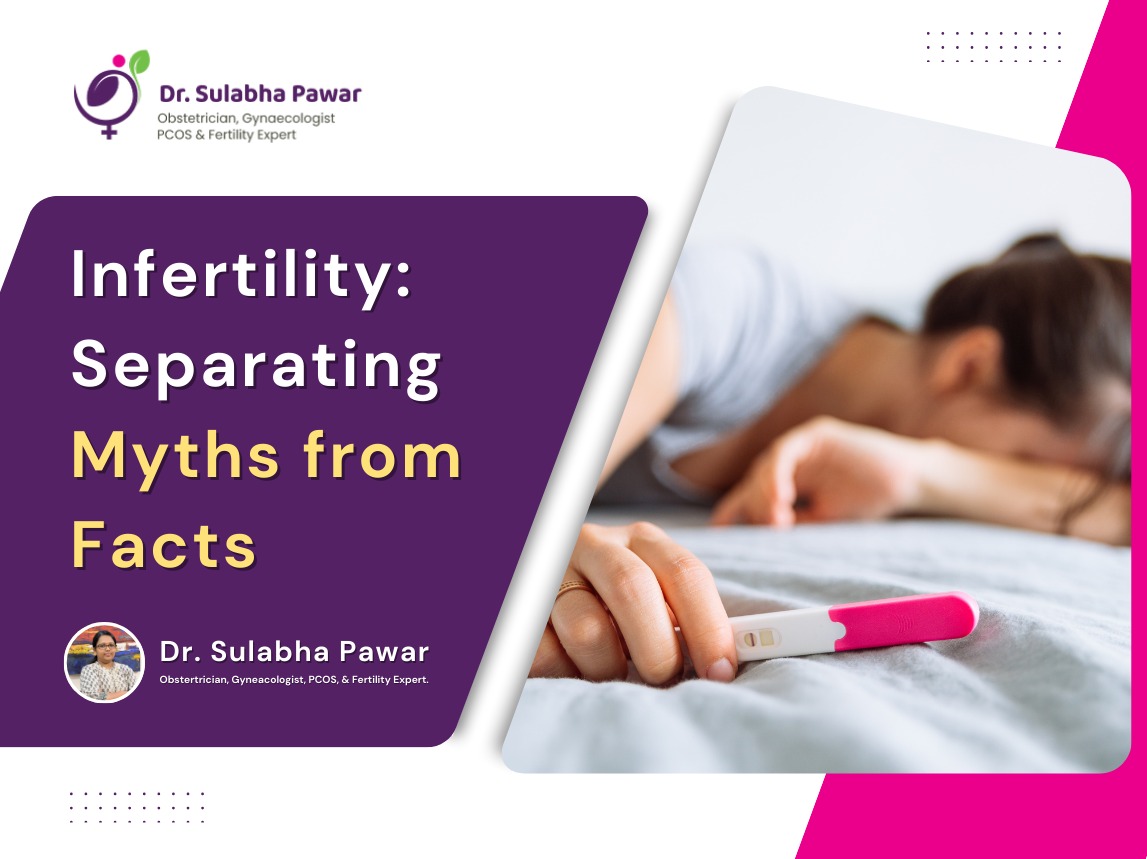Infertility: Separating Myths from Facts – Expert Insights by Dr. Sulabha Pawar
Introduction:
Infertility is a deeply personal and often misunderstood journey. Despite advancements in medical science, misconceptions around infertility continue to persist, clouding the experience with unnecessary stress and stigma. In this blog, Dr. Sulabha Pawar, a leading Gynecologist and Obstetrician with expertise in PCOS and fertility care, sheds light on some of the most common myths and presents the facts based on scientific evidence. Understanding the truth behind infertility is crucial not only for those facing this challenge but also for creating a more compassionate and informed society.
Myth 1: Infertility is always the woman’s problem.
Fact: Infertility affects both men and women equally.
While there is a common misconception that infertility is primarily a woman’s issue, the truth is that both men and women are equally likely to face fertility challenges. In fact, male infertility accounts for approximately 40-50% of all infertility cases. Conditions such as low sperm count, poor sperm motility, and lifestyle factors like smoking or excessive alcohol consumption can contribute to male infertility. It’s essential for both partners to undergo evaluation when dealing with infertility, as a team approach is often the most effective.
Myth 2: Age doesn’t affect fertility until you are over 40.
Fact: Fertility declines as early as the mid-30s for women.
Although women may be more aware of the ticking “biological clock” in their 40s, fertility actually begins to decline in the early to mid-30s. A woman’s egg reserve decreases with age, and the quality of eggs diminishes, making conception more difficult. Dr. Pawar emphasizes that while women in their 40s can and do conceive, it’s important to recognize that the chances of natural conception decrease significantly after age 35. For men, fertility tends to decline more gradually but can also be affected by age.

Myth 3: If you’ve already had a child, you can’t be infertile.
Fact: Secondary infertility is a common issue.
Having successfully conceived once does not guarantee that conception will be easy again. Secondary infertility, which occurs when a person is unable to conceive after having one or more children, is more common than people realize. Factors such as age, hormonal changes, weight fluctuations, and health conditions like endometriosis or PCOS can contribute to secondary infertility. Seeking medical advice early, especially if there are signs of infertility, is key to understanding and addressing any underlying issues.
Myth 4: Stress is the main cause of infertility.
Fact: While stress can impact health, it is rarely the sole cause of infertility.
It’s often suggested that “just relaxing” will increase the chances of conceiving, implying that stress is the cause of infertility. While stress can indeed affect overall health, including reproductive health, it is rarely the primary cause of infertility. Infertility is a medical condition that may result from various factors including hormonal imbalances, anatomical problems, or sperm abnormalities. Dr. Sulabha Pawar reassures patients that reducing stress is beneficial for overall well-being, but medical evaluation is crucial for addressing the root causes of infertility.
Myth 5: IVF is the only treatment for infertility.
Fact: There are various treatments depending on the cause of infertility.
In vitro fertilization (IVF) is one of the most well-known treatments for infertility, but it is not the only option. Depending on the cause of infertility, there are a range of treatments available. These include lifestyle changes, medications to stimulate ovulation, intrauterine insemination (IUI), or surgery to correct anatomical issues. IVF may be recommended in cases where other treatments have not been successful, but it is by no means the first or only step in fertility care. Dr. Pawar encourages couples to consult with a fertility specialist to determine the most appropriate course of action.

Myth 6: Birth control use causes infertility.
Fact: Birth control does not cause infertility.
There is a widespread belief that prolonged use of birth control can lead to infertility, but this is untrue. Hormonal contraceptives, such as birth control pills, temporarily prevent pregnancy by regulating hormones, but once a person stops using them, fertility typically returns to normal. Some women may experience a brief delay in the return of regular menstrual cycles after stopping birth control, but this is not the same as infertility. Dr. Pawar assures that long-term use of contraceptives does not affect one’s ability to conceive later in life.
Myth 7: Lifestyle factors have no impact on fertility.
Fact: Lifestyle choices play a significant role in fertility.
Healthy lifestyle choices can boost fertility, while certain habits can impair it. Smoking, excessive alcohol consumption, poor diet, and lack of exercise can all negatively impact fertility in both men and women. Maintaining a healthy weight, staying physically active, and consuming a balanced diet rich in essential nutrients are vital for reproductive health. Dr. Sulabha Pawar emphasizes the importance of managing stress, limiting caffeine and alcohol, and avoiding harmful substances as part of fertility care.
Myth 8: Infertility means you’ll never be able to have a child.
Fact: Many people with infertility go on to have children with treatment.
Infertility can feel like an insurmountable barrier to starting or growing a family, but it’s important to remember that there are many successful treatment options available. With modern medical advancements, many couples facing infertility are able to conceive and carry healthy pregnancies. Whether through medical interventions such as fertility drugs, IUI, IVF, or alternative options like adoption or surrogacy, there are multiple paths to parenthood. Dr. Pawar encourages patients to remain hopeful and explore all available options with their fertility specialist.

Myth 9: You don’t need to see a fertility specialist unless you’ve been trying for years.
Fact: Seek help after 6-12 months of trying to conceive.
It’s a common misconception that couples need to wait years before seeking help for infertility. However, if a couple has been actively trying to conceive for more than 12 months without success (or 6 months if the woman is over 35), it’s time to consult a fertility specialist. Delaying medical help can reduce the chances of successful treatment, especially as age-related fertility decline becomes a factor. Early intervention can lead to earlier diagnosis and more effective treatment.
Conclusion:
Understanding the facts about infertility is empowering, especially in the face of myths that can make an already challenging situation even more difficult. Dr. Sulabha Pawar emphasizes that infertility is a medical condition, not a reflection of one’s worth or ability to parent. With the right information, compassionate care, and medical support, individuals and couples can navigate their fertility journey with confidence and hope. Remember, infertility is not the end of the story, but rather a part of a larger narrative in the pursuit of parenthood.




